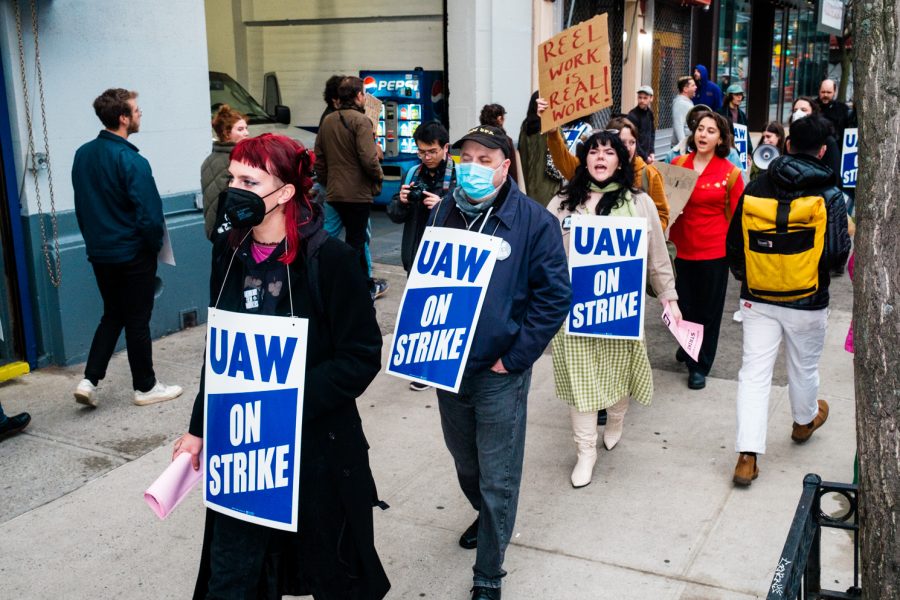Anthology Film Archives staff goes on strike
Anthology Film Archives, the renowned East Village film institution known for screening avant-garde cinema, shut its doors when workers took to the streets to protest stagnant wages and union-busting actions from its board of trustees.
Anthology Film Archives workers went on strike after months of stalled negotiations with the theater’s management. (Staff Photo by Samson Tu)
April 4, 2022
Anthology Film Archives’ staff went on strike on March 31, 2022. AFA’s staff initiated labor contract negotiations back in September of 2021. Their demands focused on higher wages, workplace protection and union security. Last week, the staff shut their institution’s doors and took to the streets to protest their management’s failure to address their demands.
Anthology Film Archives was founded in 1970 by Lithuanian-born poet-filmmaker Jonas Mekas. Previously operating under the name of Film-Maker’s Cinematheque, AFA moved twice, settling down at the Second Avenue Courthouse, where it remains today. The theater has devoted itself to screening anti-capitalist and avant-garde films since its inception but has neglected to treat its workers fairly, as far as its current staff remembers.
“The wages are poverty wages, they have been for years,” said Josh, 34, a long-term part-time worker. He asked that his last name not be printed, citing concerns about his words affecting the legacy of AFA.
Last year, AFA’s staff voted unanimously to unionize with United Auto Workers Local 2110, a union with members at multiple New York City cultural institutions including the Strand Book Store, the Museum of Modern Art, Film At Lincoln Center and the Whitney Museum of American Art. Since then, AFA’s management has failed to address their demands for liveable wages, workplace protections such as layoff protections and severance pay, and refused to drop their proposal for an “open shop.” The latter is a typical union-busting strategy that would force AFA to continually organize new staff to join their union and potentially erode the strength of their bargaining unit over time.
“I want to let our board of trustees know living wages for the staff are the priority and urgent,” John Klacsmann, an archivist and leading member of Anthology Film Workers’ Bargaining Committee, said. “I’m hoping they would recognize Anthology is the staff.”
AFA’s entire staff stood outside of the brick building from 6:30-9:30 p.m. on March 31, chanting picket rallying cries such as “What’s disgusting? Union-busting!” and “What do we want? Contracts! When do we want them? Now! If we don’t get them? Shut it down!”
Friendly faces quickly joined the strike in solidarity, clanging cymbals, holding up protest signs and projecting more protest slogans like “Essential Workers For Essential Cinema” and “There Is Power In A Union.”
Experimental film director and theater manager Bradley Eros showed up to the strike with his own list of perfume-themed strike poems, stating what his colleagues were doing was great, but that he thought they needed something a bit more poetic to honor the artistic legacy of the beloved film institution.
“This is a union celebration,” Eros said. “I’ve made a bunch of subverted perfume ads. I mean, a poet made this place. I knew I had to show a bit of creativity when it came to the strike.”
Playing off of Essential Cinema, AFA’s popular film series, and the staff’s stagnant wages, one of Eros’ protest poems read “Essential Scents for Essential Cinema! / Essential Cinema for Essential Workers!”
Later into the strike, members of Cine Móvil, a mobile cinema spreading revolutionary culture, set up a projector in front of AFA’s main entrance and started playing Buster Keaton’s “Cops.” The move was a jab at AFA’s inclusion of the film in their program the following day, highlighting the inherent controversy behind the institution’s screening of anti-capitalist films while exploiting its workers.
AFA’s Bargaining Committee met to negotiate their union contract with their board of trustees following the strike and has yet to hear back regarding updates on their demands. Eros suggested that a follow-up event in the style of an art show would take place in front of St. Mark’s Church in-the-Bowery to celebrate the union’s efforts. In the meantime, AFA will continue fighting for a fair contract and screening essential cinema.
Email Nicolas Pedrero-Setzer at [email protected].

























































































































































